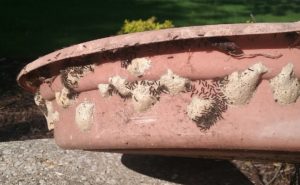By Bill McNee, DNR forest health specialist, Oshkosh, bill.mcnee@wisconsin.gov, 920-360-0942
Gypsy moth eggs are expected to start hatching as temperatures warm in the next few weeks. Now is a great time for homeowners to check their trees for egg masses and treat or remove any that are found. Removing the egg masses now will help protect trees from defoliation and reduce future caterpillar populations.

Gypsy moth larvae hatching from egg masses on an outdoor bowl.
The first thing to do is inspect your trees for egg masses. Egg masses are tan-colored lumps about the size of a nickel or quarter. They can be found on nearly any outdoor surface, including tree trunks, undersides of branches, buildings, firewood piles and other outdoor objects. Each one can contain 500 to 1,000 eggs that will soon hatch into hungry leaf-eating caterpillars. Wisconsin’s gypsy moth populations are currently low, but isolated trees and sites can still have high populations and levels of damage.
If egg masses are found, there are two options to help reduce pest numbers. Horticultural oils, available at many garden centers and retail stores, can be directly applied to the egg masses to suffocate them. These oils are most effective when temperatures are above 40 degrees and not expected to dip below freezing for a few days. Egg masses that are within reach can also be scraped into a can of soapy water and left to soak for a few days before being thrown away in the trash.
Insecticide treatments may be appropriate for larger trees that have many egg masses. Some types of treatment are done before eggs hatch, and some are done while the caterpillars are small. Property owners looking to treat large yard trees should reach out to a professional soon. A list of certified arborists is available on the Wisconsin Arborist Association website, and other businesses offering insecticide treatments may be found online or in a phone book. Check the qualifications of any business that may be hired to do insecticide treatments. Questions about woodlot management should be directed to a professional forester.
Additional information about management options for homeowners, including sticky barrier bands and burlap collection bands, is available at the Wisconsin gypsy moth website.
